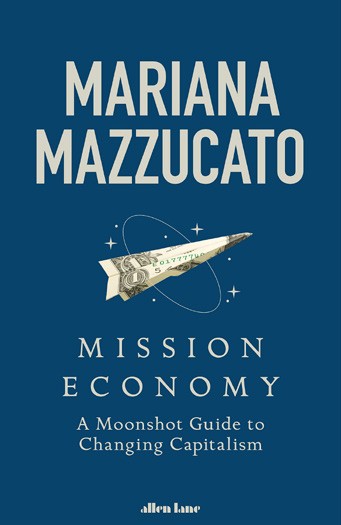A marketplace for moonshots
-
- from Shaastra :: vol 01 edition 01 :: May - Jun 2021
Mariana Mazzucato makes a compelling case for reimagining governments and economic systems, to spur innovation and face up to tomorrow’s challenges.
THE outbreak of COVID-19 has seen governments in different countries adopt different approaches to tackle the pandemic. Success in controlling the pandemic has not been easy to achieve. Many rich countries simply could not cope with the pressures of managing the pandemic, while some developing countries, such as Vietnam, have handled it rather well. How did the rich countries fail?
Mariana Mazzucato, a well-regarded economist, has an explanation. Her belief is that handling the pandemic has not been a question of resources. Instead, success has crucially depended on the depth and robustness of the organisational capacity of the government and its ability to engage with public- private partnerships. Quite to the contrary, however, the developed world has embraced an ideology that has allowed the government to take a back seat and intervene occasionally or selectively to fix problems as and when they arose.
This is what has inspired the new public management principles adopted by most developed countries. In such a scenario, the government withdraws itself, even as it encourages privatisation or outsourcing of functions it should have discharged on its own. This can degenerate into a vicious cycle. It leads to lower investment in public facilities and capabilities, institutional weaknesses and an increased dependence on private consulting companies. Thus, the ability of many governments has suffered hugely in dealing with COVID-19.
STATE CAPACITY IS THE KEY
It is this belief of Mazzucato that acts as the central premise of her latest book, Mission Economy: A Moonshot Guide to Changing Capitalism. Taking the management of COVID-19 as an example, she argues that government intervention in times of crises yields the desired results only if the state has the necessary capability to make a difference. But governments in most countries have reduced themselves to being “fixers of market failure” at best – and “outsourcers” at worst.
Instead, Mazzucato believes that governments should invest in building capacity in key areas such as “productive capacity, procurement capabilities, public-private collaborations that genuinely serve the public interest, and digital and data expertise (while safeguarding privacy and security)”. If the government does not build such capacity, the prospects are scary. Companies that are brought in to do the government’s job would capture the agenda and public cause would be in jeopardy.
The sombre thought that Mazzucato’s analysis triggers is that governments in most countries have made a serious mistake in weakening themselves even as they face a plethora of challenges on health, climate and digital technology. She makes a passionate plea for transforming government from within and strengthening its systems for health, education, transport and the environment, and thereby giving the economy a fresh impetus and direction. This is not to be confused with the desire, often expressed by Left thinkers, for a bigger and larger government. It is a desire for a government that needs to build capacity to face up to the new challenges.
THE ORIGINAL ‘MOONSHOT’
The inspiration for her thoughts on reimagining government is triggered by a development in the United States more than half a century ago. Mazzucato draws upon the lessons from a project that the U.S. Government had in 1962, under President Kennedy, embarked on to send a man on the moon before the end of that decade. This was the Apollo Moon project and it was not about outsourcing or privatisation. It was about public-private partnership. Most importantly, it was about a mission approach – a strategy that involved designing policies that could channel investment, innovation and collaboration to achieve the desired goals.
More significantly, this was a strategy that required governments to ask what kind of markets people wanted, rather than fixing the problem in markets. The focus in a mission approach has to be on identifying the goals and how budgets could be structured to achieve those goals. The lessons from the Apollo Mission are many, and Mazzucato devotes an entire chapter to discuss them and, in particular, underline the importance of vision and purposeful leadership, risk-taking innovation, agility and flexibility in bringing about organisational change, collaboration and outcome-based budgeting.
RETHINKING CAPITALISM
It is important to recognise that Mazzucato is not just trying to rethink the way governments should function; she is rethinking capitalism itself. The two are inextricably interlinked. Capitalism could be changed by modifying how governments are structured and how businesses are run and how public and private entities can collaborate to achieve pre-determined goals. Such focus on rethinking governance structures is an integral part of the kind of mission-oriented approach that Mazzucato advocates to address the global economic challenges.
An entire chapter in the book, therefore, is focussed on the crisis that Mazzucato believes has gripped capitalism. Her gripping analysis brings out how instead of ensuring a sustainable growth path, capitalism has widened inequalities by making the rich even more rich and created speculative bubbles. Private debt rose to 150% of gross domestic product (GDP) in the US, 170% in the UK, and 200% in France; and if you thought the Chinese economy was an oasis of sorts, Mazzucato will quickly remind you that private debt in China is now 207% of GDP.
With amazing clarity, Mazzucato explains how capitalism has been embroiled in its current crisis. She identifies four sources of the crisis that faces capitalism: short-termism of the financial sector, financialisation of business, climate emergency, and absent governments. There can be no quarrels with her diagnosis of the problem.
There is also no denying that the financial sector has been largely financing itself or the FIRE sector (companies in the fields of finance, insurance and real estate). The problem gets more complicated, as she notes, when FIRE profits remain private, but its losses become public as a result of the bailout of these sectors that governments announce far too easily and frequently. This process implicitly incentivises the FIRE sector players to continue to take excessive risks.

A ‘moonshot’ project needs a mission approach, a strategy that involves designing policies that can channel investment, innovation and collaboration to achieve the goal.
THE CURSE OF SHORT-TERMISM
Similarly, business has begun excessively focussing on quarterly returns to shareholders, instead of genuine growth of the companies. Such pursuit of shareholder value has encouraged companies to devise financial structures that benefit shareholders more than the other equally important stakeholders like workers, suppliers, customers and most importantly the society in general. The lack of focus on climate concerns and the abdication of responsibilities by governments in fixing economic problems have underlined the need for a new approach.
Thus, Mazzucato argues that governments must reinvent themselves to provide direction to its policies on taxation, fiscal management or even the conduct of monetary policy. She raises a few important questions: Why is there no attempt towards de-financialisation or sustainability? Why is there no attempt at taxing the environmental “bads” and favouring “green”? Why are capital gains taxed at a rate lower than income earned from work? Why are benefits for investing shortterm more attractive than those for investing long-term? Many of these questions have been raised in the past. But Mazzucato scores by placing them in the context of a general need for reimagining the government with “the capacity and capability to energise and catalyse the economy to be more purpose-driven”.
MAZZUCATO THE MYTHBUSTER
In that process, she also busts five popular myths about the government and business – and the manner in which they operate. The idea that businesses create value and take risks, while governments only de-risk and facilitate, is comprehensively debunked. Citing the work done by the National Aeronautics and Space Administration (NASA), the Defence Advanced Research Projects Agency (DARPA) and the European Organisation for Nuclear Research or CERN, Mazzucato establishes that governments do create value and take risks. Indeed, the ambitious public investment in the areas where NASA, DARPA and CERN operated helped create opportunities for the private sector to expand and grow.
Mazzucato also debunks the notion that the purpose of government is to fix market failure. Instead, she argues, government investments can crowd in private investments, when these are structured strategically. An equally popular idea, which she dismisses, is that governments need to run like businesses. She also questions the ideas that outsourcing saves taxpayer money and lowers risk and that governments should not pick winners. All these ideas are a product of neo-liberal economic thinking, and Mazzucato challenges them in detail with examples and anecdotes.
There is an excellent section on the changes that Mazzucato believes must be brought about to strengthen the structure of political economy that governments try to manage in different countries. There can be little debate over the attention that she believes must be focussed on how business, government and civil society should work together to create value, the need for governments co-creating and co-shaping markets, instead of fixing market failures, organisations built on the principle of co-operation and not competition, a renewed emphasis on longterm financing and the goals of distribution, inclusive growth, partnership and participation.
A big attraction of the book is that Mazzucato does not write like an economist. A simple style, to the extent that she avoids using jargon, makes the book accessible and easy to read. You may not agree with her entire thesis or may even debunk it as utopian, but her plea for reinventing the government to tackle the challenges that the global economy faces is compelling.
A.K. Bhattacharya
Editorial Director,
Business Standard

@AshokAkaybee
Have a
story idea?
Tell us.
Do you have a recent research paper or an idea for a science/technology-themed article that you'd like to tell us about?
GET IN TOUCH
















